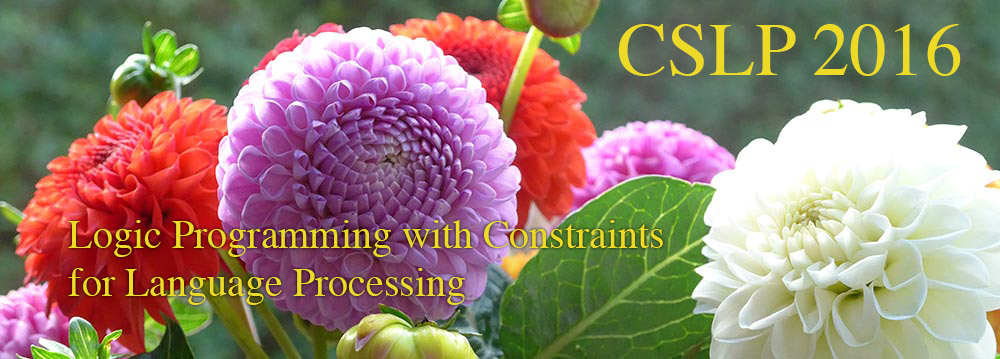

|
8th International Workshop on Constraints and Language Processing, CSLP 2016One day of 17–21 Oct, 2016http://control.ruc.dk/CSLP2016/ A workshop affiliated with ICLP: International Conference of Logic Programming 2016, New York, USA
Organized by Workshop Purpose: Constraints are widely used in linguistics, computer science, psychology and many other fields. How they are used, however, varies widely according to the research domain: natural language processing, knowledge representation, cognitive modeling, problem solving mechanisms, etc. Since 2004, the CSLP workshop series have addressed different constraint oriented ways of modeling and treating language, and this time – the 8th CSLP workshop – is affiliated with the International Conference of Logic Programming, and focuses (non-exclusively) on logic programming based methods. This workshop addresses the question of how to best integrate constraints from an interdisciplinar perspective and with logic programming as a pivot, in view of powerful and robust human language processing. The topics include, but are not limited to, constraint-based linguistic theories, constraints in human language comprehension and production, constraint handling rules (CHR) and constraint handling rule grammars (CHRG), context modeling and discourse interpretation, acquisition of constraints, grammar induction through constraints, probabilistic constraint-based reasoning, constraint satisfaction technologies and constraint logic programming – all around the axis of logic programming. Several years of CSLP workshops (see left menu) aiming at integrating the different approaches on Constraint Solving and Language Processing shed light upon possible common frameworks capable of explaining how constraints play a role in representing, processing and acquiring linguistic information, and this from a formal, technical, and cognitive perspective. Among these frameworks, those that contained logic programming as a main aspect emerged as the most promising ones, e.g.. Constraint Handling Rules (CHR) as an extension to the logic programming language Prolog has added a mechanism for forward-chaining reasoning to complement Prolog's standard backwards chaining, goal-directed style. The combination of the two proved to provide a very powerful reasoning framework that creates an extended potential in applying logic programming for language processing and reasoning. Such results allow us to predict that adding logic programming may quite likely jump-start a whole new area of research that stands to revolutionize and revitalize formal logic approaches to NLP, adding robustness and flexibility to the models that can now be achieved, while elegantly marrying efficiency with direct executability.
Topics include, but are not limited to:
Submission: Authors are invited to submit a full paper of up to 12 pages or a position paper of 1-2 pages. Papers must be submitted electronically as PDF files and be prepared using the Springer LNAI/LNCS format. Previously published papers cannot be accepted, but new and perhaps preliminary work are welcome. Position papers may present preliminary ideas and-or be intended to generate discussion and controversy; they may or may not be included in the proceedings.
Submissions will be
reviewed by the international program committee.
One author for each accepted paper must attend the workshop in order to
present the paper.
Proceedings will be made available for the participants and made available online. Submission site: Please submit your paper via the easychair system here: Important dates:
|